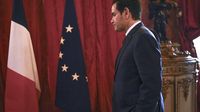In a historic move, Marco Rubio has taken on the dual roles of Secretary of State and acting national security adviser, a first since Henry Kissinger held both positions in the 1970s. This unprecedented arrangement has sparked discussions among political analysts and former officials about the implications for U.S. foreign policy and national security.
On May 5, 2025, NPR reported on former national security adviser John Bolton's insights regarding Rubio's new responsibilities. He expressed skepticism about the effectiveness of juggling both roles, suggesting that it may actually diminish President Trump's control over the State Department and national security agencies. "If President Trump believes the move gives him more control, he is dead wrong," Bolton stated. He emphasized that while there is some overlap between the two positions, they are fundamentally different and require distinct skill sets.
Bolton's comments came in the wake of President Trump's decision to nominate Mike Waltz, the former national security adviser, to represent the U.S. at the United Nations. This change was reportedly prompted by Waltz inadvertently sharing sensitive information in a group chat, which included The Atlantic's editor-in-chief. Vice President Vance has denied that Waltz's removal was a "firing," but the implications for the administration's decision-making processes are significant.
Historically, the role of national security adviser has been crucial in coordinating discussions among various departments and agencies, providing the president with the necessary information to make informed decisions. The Secretary of State, on the other hand, leads a massive department tasked with executing the country's foreign policy objectives. Bolton pointed out that the national security adviser often acts as an "honest broker," helping to mitigate disputes between departments based on institutional disagreements.
Reflecting on the potential challenges ahead, Bolton noted, "All of these jobs are more than full time. And when you diminish one aspect of one of the jobs, you're going to tilt the system in a way that's ultimately disadvantageous to the president, even though he may not see it that way and probably disadvantageous to the country, too." He warned that Trump's approach could lead to a less informed decision-making process, as the president may be surrounded by staff who are more focused on pleasing him than on providing honest assessments.
Additionally, Bolton highlighted that the president's longstanding suspicion of the National Security Council staff may have influenced his decision to combine these roles. Trump has previously expressed concerns about elements within the NSC staff representing a "deep state" that could undermine his presidency. However, Bolton argued that this strategy could backfire, as it reduces the president's scope of control.
As the political landscape evolves, the implications of Rubio's dual roles will likely be scrutinized by both supporters and critics of the administration. Some may view this as an opportunity for Rubio to position himself as a key player in the administration, especially given recent discussions about potential successors to Trump.
In a cabinet meeting on April 30, 2025, Rubio addressed the challenges ahead, acknowledging the weight of his new responsibilities. "It’s a unique opportunity, but it’s also a heavy burden," he remarked, indicating his awareness of the complexities involved in managing both roles effectively.
Bolton's commentary underscores the potential risks associated with this unprecedented arrangement. As the U.S. faces a multitude of global challenges, including ongoing tensions in the Middle East and the need for effective diplomacy, the effectiveness of a single individual managing both the State Department and national security may come under increasing scrutiny.
The decision to appoint Rubio to these dual roles is not only a significant moment in U.S. political history but also raises questions about the future of American foreign policy and national security strategy. As events unfold, the effectiveness of this arrangement will be closely watched by political analysts and the public alike.
In a broader context, this development reflects the ongoing evolution of presidential power and the complexities of governance in an increasingly polarized political environment. The ability of a single individual to navigate the demands of both the Secretary of State and national security adviser roles will be tested in the coming months.
As the Trump administration continues to shape its foreign policy agenda, the effectiveness of Rubio in these dual roles will be pivotal. The stakes are high, and the implications for U.S. international standing and security are profound. The coming months may reveal whether this bold move will ultimately benefit the administration or hinder its capacity to respond to the challenges facing the nation.




